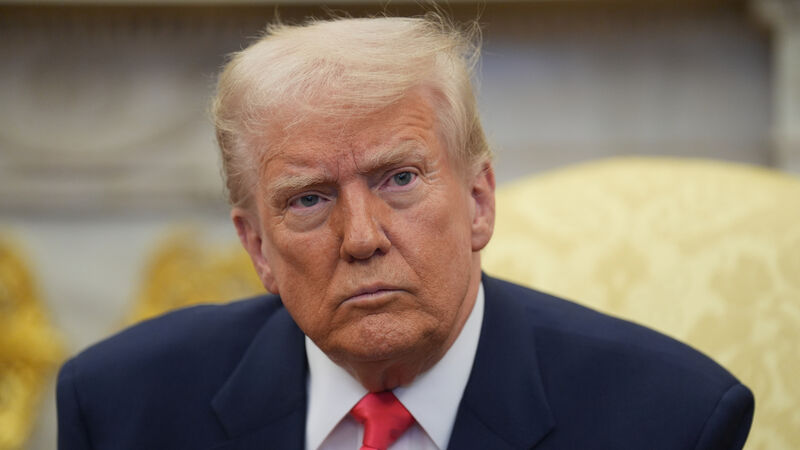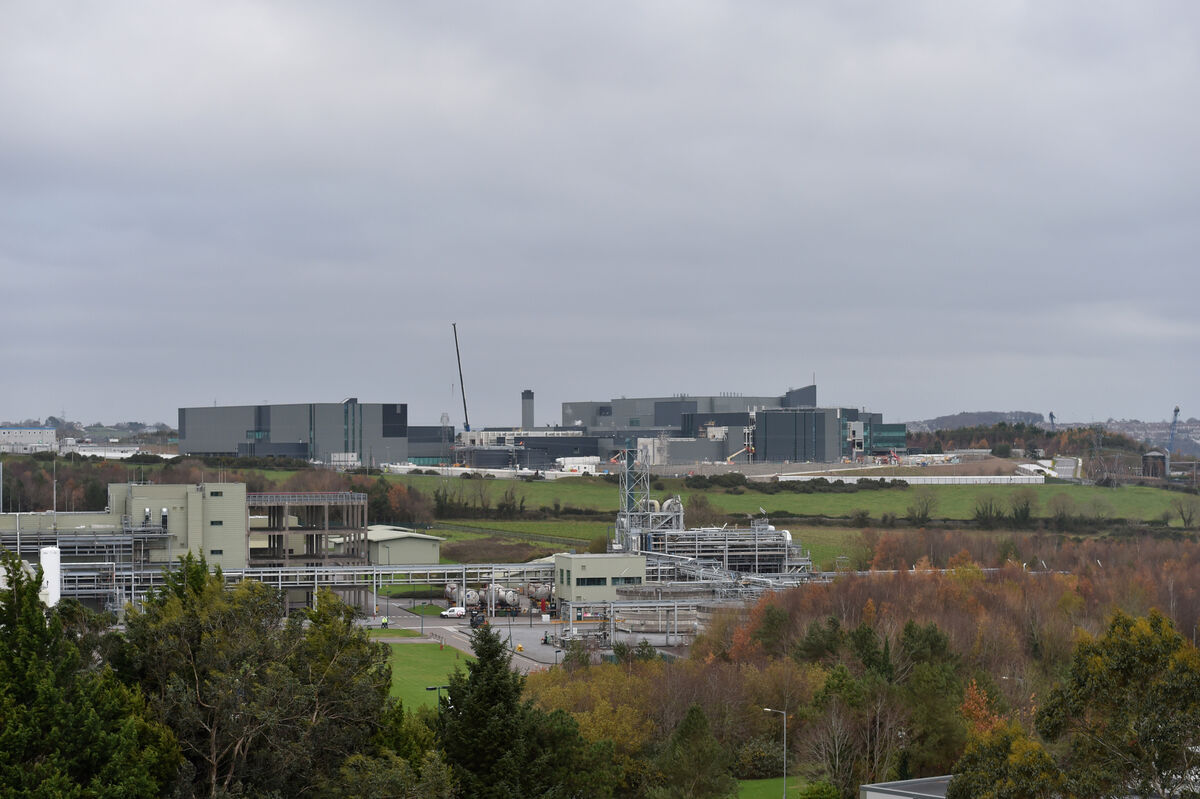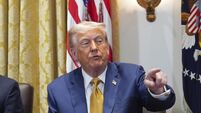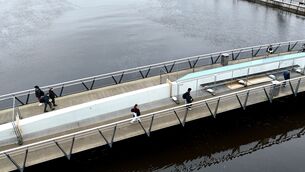Ireland, and Cork, vulnerable to Trump tariff threats

Earlier this month, US president Donald Trump delivered a new threat in his protectionist trade war with the rest of the world: Tariffs on pharmaceuticals.
EARLIER this month, US president Donald Trump delivered a new threat in his protectionist trade war with the rest of the world: Tariffs on pharmaceuticals.
In the next 18 months, he plans to introduce a 150% tariff on imported pharmaceuticals and then raise it to 250% at an unspecified later date. He mentioned Ireland as a problem when he declared that he wanted US pharmaceutical manufacturers to bring jobs back home.
This new threat comes on top of the recent agreement on a blanket 15% tariff on EU imports to the US, which was hammered out by Mr Trump and EU Commission president Ursula Von Der Leyen in Scotland last month.
The announcement must have set off alarm bells in government buildings, at the IDA, in corporate offices, the dozens of US pharma companies operating here, and the homes of the 10,000 or so people in Cork whom those companies directly employ.
According to Cork City Council’s estimates, more than 30 pharmaceutical and life sciences companies have a base in Cork, directly employing more than 10,000 people. Those 30 include seven of the 10 largest pharmaceutical companies: Janssen, Pfizer, Merck/MSD, Novartis, Eli Lilly, Thermo Fisher Scientific, and AbbVie. In addition, Cork manufactures six of the top 10 most lucrative drugs in the world, each selling more than $1bn (€850m) worth a year.
Reacting to the latest broadside from Mr Trump, Taoiseach Micheál Martin said: “Tariffs are not good for the world economy, they’re not good for people; workers or consumers.”
He said that the United States’s global dominance in pharmaceuticals is because of their footprint around the world, including in Ireland.
“Ireland has added value and strength to those companies, and I would say to the president he needs to factor that in to the equation. Those companies will be damaged and undermined if such politics were to bear fruit.”
That potential damage to pharma companies’ bottom lines is likely the biggest road block for the tariffs, not the concerns of European leaders or needs of patients relying on these crucial drugs.
The pharmaceutical industry is worth hundreds of billions of dollars to the US economy. At the top is Johnson & Johnson — it has two bases in Cork, through its Janssen subsidiary — which had revenue of $88.2bn (€75bn) in 2024. Other revenue giants include Merck ($64.17bn/€55bn), Pfizer ($63.63bn/€54bn), and AbbVie ($56.33bn/€48bn).
The pharma industry has long had the biggest lobby budget in Washington, though usually aimed at more co-operative policy makers.
With pro-tariff Mr Trump in the White House and anti-everything Robert Kennedy heading the US’s health department, the cosy corporate-political relationships of old are being challenged.
Since the election, pharma companies have been beefing up their lobbying budgets. They have found alignment with Republicans on controversial issues around pricing and tax breaks, but these extreme tariffs are something they will have to find a way to confront.
As the second Trump administration started blasting out policy goals earlier this year, the phrase TACO kept doing the rounds: Trump Always Chickens Out.
That was fairly true in his first term. During the 2016 campaign, he made all kinds of promises and throughout his time in office he offered a constant stream of big new ideas via Twitter or the pulpit at his rallies.
While this stream-of-conscious approach to politics dominated the news cycle, it rarely translated to actual policy. During his first term, Mr Trump’s most extreme ideas were tamed by a strong civil service and a Republican party that saw him as a means to many ends, but not a true leader.
Upon his re-election, many expected the same thing: Big ideas with no follow through, while the adults in the room kept things in check.
But as 2025 has rolled on, the world is realising that there are no adults in the room.
During his time in the wilderness after losing the 2020 election, Mr Trump somehow reshaped the Republican party in his image. The traitors have been exiled and the loyalists promoted.
From the day of his second inauguration, he has gutted departments of staff at every level and torn down every guardrail he could see.
With the rulebook ripped asunder and the federal government under his thumb, no one can force him to do anything.
No more negotiation, no more brinkmanship — contort yourself to Mr Trump’s wishes or suffer your fate.

The true art of the deal has finally shown its face.
The only defence the rest of the world has is time.
We’re now half a year in to a four-year term — though who’s counting? — and the next administration is likely to change tack.
While protectionism has its usefulness, it hasn’t been popular in its broadest forms for the better part of a century.
Mr Trump is certainly an outlier in terms of mainstream US politics, where global dominance has been built by tearing down trade barriers, not building them up.
Cork’s pharma cluster didn’t develop overnight, and it can’t easily be picked up and moved elsewhere, either.
While Mr Trump expects them to shutter their factories in Ringaskiddy and relocate stateside, that’s not a realistic option for any major pharmaceutical company, especially not on the timeframe of a single four-year presidential term.
Building a factory takes years. Building a supply chain takes years. Building a talent pool takes years. If you wanted to relocate a whole operation from Cork to Colorado, you’re talking timelines far beyond the horizon of the Trump administration, and likely a few more presidents after him.
Novartis was the first major pharma company to plant its flag in Cork, and that was in the 1950s.
As the decades rolled on, more and more companies moved in and Cork reshaped itself around them.
Supply chains for everything from raw materials to machinery have long established routes to Ringaskiddy.
For every major pharma company, there are many smaller companies offering additional outsourced expertise.
University College Cork and Munster Technological University churn out thousands of highly qualified pharma workers each year, many of whom will have already worked in one of the major companies during their degree, and those are just the universities in Cork.
Highly skilled and experienced workers bounce around between companies, and many more from abroad are attracted in.
Sure, the taxes are a big part of the deal, but a cluster like that is hard to find and even harder to replace. As the Taoiseach said, Ireland doesn’t subtract value, it adds it.
While pharmaceutical companies might invest more in the States to strengthen their operations and shield certain drugs from tariffs, a massive relocation of operations based on the whims of a single anomaly of a president would be madness.
With that said, tariffs can’t be ruled out, and they will have an effect.
EU leaders thought they could call Mr Trump’s bluff earlier this year, but now we’re facing 15% on our exports with nothing in return.
While lobbying and industrial realities might stay his hand, the 250% threat might come down, but any percentage would still have a significant effect on trade.
Reason is out the window, and all we can do is wait.
Tariffs won’t make America great again when goods made cheaper abroad
While Donald Trump’s approach to tariffs might be extreme, it’s what many of his working-class voters in hollowed-out industrial states voted for.
Mr Trump has an archaic vision of the United States as a manufacturing powerhouse, where goods are made by Americans, just like the good old days.
And millions of voters who agree with him — hence the policy — having seen factory after factory shut down, with no transition for workers while the market gets flooded with cheaper, imported goods.
While those class concerns are valid, that version of the American dream is unrealistic in today’s interconnected world, where mechanisation and low-cost labour squeeze people out. Were that dream to come to pass, the disruption to costs and currencies would be immense as people realise that their access to low-cost consumer goods was built on decades of outsourcing production to lower-income countries.
It’s a problem of globalisation that Ireland knows about. A good case study is the sugar beet industry.
In 2006, it was announced that Mallow’s Greencore sugar plant — the last of its kind in Ireland — was to shut down. The move followed a shift in trade policy from the EU, which removed tariffs on sugar imports from non-EU countries. Previously, a combination of sugar quotas and tariffs had buoyed up the sugar industry across Europe, including in Ireland.
But, sugar beet-growing Europe can’t compete on production with the sugar cane-growing countries in warmer climates in the global south, much in the same way that it’s hard to compete with the Irish climate’s unique suitability for dairy and our export domination.
The disappearance of the sugar beet industry was devastating for Mallow, just as it had been for towns like Carlow and Thurles, where plants had closed already. Some 330 people in Mallow were laid off, in an industry that employed upwards of 10,000 at its peak.
Many people still long for the days of sugar production and the stable income it brought for so many families around the country. And with a spike in prices in recent years, due to shifts in supply and demand around the world, there has been much talk of a return to sugar beet production, because, even with lower yields and higher prices, it could be viable again.
But would it work?
Ireland has changed. Sugar production is just one of the many industries we have lost over the last few decades, but our unemployment rate stands at just 4%, a 24-year low. Competition between employers is high and low-paying general labour roles are only being filled by immigrants.
Two-thirds of Irish school leavers go on to higher education. The children of factory workers are working in high-skill, high-pay jobs. They’re the ones working in the pharma and tech industries, the engines of the modern Irish economy.
They’re not longing for the back-breaking days on the beet.
More employment at all levels can only ever be a good thing, but you can’t turn back the hands of time. And that’s a lesson that the US is going to learn the hard way in the years ahead.
Our reliance on FDI exposed
The trade war has brought to the fore an existential crisis for the Irish economy that our leaders have neglected for too long : Our reliance on foreign direct investment (FDI).
For decades, we’ve boasted of our strength as a small, open economy, and it’s true, because there is no modern Ireland without opening ourselves up to trade.
But that wasn’t always the case. After independence, Ireland pursued a policy of protectionism to build up domestic industry after centuries of British extractive colonialism.
By taxing foreign imports early, governments believed they could stimulate industry, create jobs, and build a strong, resilient society.
Instead, Irish people were leaving the country in droves to seek opportunities elsewhere, while those who remained were stuck between a rock and a hard place.
In the 1950s, Seán Lemass — one of the architects of protectionism — became taoiseach around the same time that TK Whitaker rose to prominence in the Department of Finance.
Born just a few months after the Easter Rising of 1916, in which most Irish leaders of the 1950s had served, Mr Whitaker was one of a new generation of Irish people coming to power who had a different vision for the country.
In his landmark First Programme for Economic Expansion, he laid out the inevitability of free trade and how Ireland should embrace it and grow. That same spirit was echoed in other departments and across many industries in Ireland.
As war-ravaged Europe figured out that building interdependence through trade was the most sustainable way of securing peace, Ireland pushed to be a part of this new, emerging order.
By the 1970s, Ireland had joined the European Economic Community, and more and more international firms were seeing the value of doing business here. The rest is history.
Ireland is now the country of choice for multinational firms trading in Europe, with major clusters in tech and pharmaceuticals, among many other industries.
But our reliance on those companies has come in to stark relief in a world where free trade is in decline and instability reigns.
In 2023, corporation tax receipts made up more than a quarter of the State’s total tax take, and that’s been rising every year. Multinationals were responsible for upwards of 84% of those corporate tax receipts, with just a handful of companies accounting for much of it. Additionally, due to other taxes, like Vat and the income taxes of people employed by multinationals, about 55% of the State’s tax intake likely comes through FDI.
There’s a saying that when America sneezes, the world catches a cold. Ireland is more likely facing pneumonia. A small, open economy is great when the going is good, but it also means we’re incredibly exposed to things far beyond our control.
Economists, industry, civil servants, and think tanks have been warning about this for years, and the second Trump presidency has shown how our relationship with the US is far less stable than we thought.
This may be the event that finally shifts our priorities to start bolstering our own industries in the years ahead.










 App?
App?


